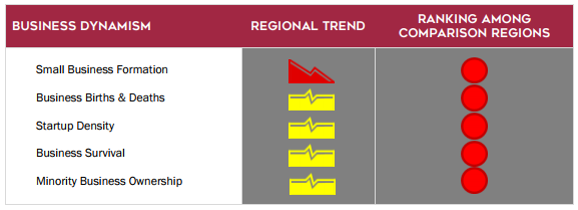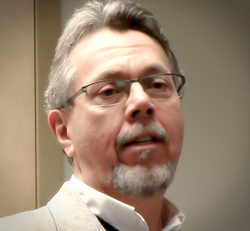Racial and economic segregation impairs economic growth according to a new study by the Brookings Metropolitan Policy Program. The formula is pretty straight forward. If the region doesn’t have a ready and accessible workforce, then business can’t expand. And if business can’t expand, then the region’s growth is stunted.
Our stunted regional growth is graphically brought home by another study recently published, this one by the Milwaukee Public Policy Forum. The report, Cultivating Innovation, rates the region’s “business dynamism” against peer cities nation-wide. A graphic summary of the report is seen in the picture at the head of this post. It shows our region behind in every business dynamic measured. What is interesting is that this report states that the regional “talent pool is strengthening….and the educational level is rising” when looking at workers in the knowledge and skilled workforce sectors. It is unfortunate that the Public Policy Forum report doesn’t break down the “talent pool” by demographics or by location (city or county). According to the Brookings study, female, black, and Hispanic workers are underrepresented in the tradable industries (the part of the economy affected by international competition) and in the STEM workforce sectors. Both provide better wages and opportunities for advancement. I suspect that what the Brookings report found at the national level is mirrored, if not accentuated at the Milwaukee regional level where there are high levels of racial and economic segregation. Another area where the region lags is in minority owned business relative to the minority population. Only Cleveland has a worse record than Milwaukee in this category. What seems clear is that our acute racial and economic segregation in the four-county area surrounding Milwaukee is stifling the economic growth of the entire region. Said another way:
The data on how segregation impairs economic growth is apparent. But knowing the data won’t change the policy dynamics that maintain the racial and economic segregation in the region. Only a change of heart within each of us will do that. Only a change of heart within the key decision makers will allow us to affect the change needed to ignite our regional economic growth. It is a bit ironic that we can develop all of the economic development plans we want, but we won’t be able to maximize our regional potential until we heal the wounds in our own hearts. It appears that the best economic development strategy for the region is for each of us to peer into our own souls and search out our capacity to share and to love. Our best economic growth strategy may be one where we reach out our hand to those around us and help all to share in the bounty.
0 Comments
All white men should apologize for the carnage we have rained down on America. After all, since 1982, 55% of all mass shootings in the United States were committed by white men. I feel like I must apologize for the mass murder in Las Vegas, Nevada this week. The shooter was a 64-year-old white male. I am a 65-year-old white male and feel some sense of obligation to everyone affected by the carnage that was committed by someone who – outwardly – looks like me. The perpetrator is reported to have been relatively wealthy, a gambler, owned multiple guns, and lived in the American southwest – none of which apply to me. I doubt he was a Quaker, but of that I am not certain. That shouldn’t make a difference. By all outward appearances, he is just like me: white, mid 60’s and male. So, I am compelled to apologize.
I expect all my mid-60s white male peers to apologize, as well. In fact, all white men should apologize for the carnage we have rained down on America. After all, since 1982, 55% of all mass shootings in the United States were committed by white men. When I first heard about the massacre in Nevada I prayed that the gunman wasn’t identified as a white male. Not another one, I thought to myself and prayed. But alas, the killer was another white male. And again – I must apologize. Isn’t that what we expect when these things happen? If the gunman was black or a Muslim or a Latino, wouldn’t we expect the leaders of the black or Muslim or Latino community to make a public statement affirming how they despise this type of violence and confirming to the broader population that these actions are not condoned nor are they representative of the black or Muslim or Latino community as a whole? If the perpetrator of the largest mass-murder in American history was a black male or a Muslim male or a Latino male, would it not cause all black or Muslim or Latino people to pause for concern? Concern that they would somehow have to “own” the actions of the murderer because – outwardly – he looked like them. Concern that the broader population would become overcome with fear and hate and resort to violence against them as a people in retaliation for the blood caused by “one of theirs”. Would the black, Latino or Muslim community need to worry that there would be political ramifications as a result of these killings such as a threat of deportation, or a ban on entering the country, or some special corrections sentencing specific to their demographic profile? But since the shooter was a white male, our black, Muslim and Latino friends cannot be held accountable. The shooter was a white male. I’m a white male, and I apologize. It’s the right thing to do. |
AuthorMichael Soika has been a community activist for more than 30 years working on issues of social and economic justice. His work for justice is anchored by his spiritual formation first as a Catholic and now as a Quaker. Archives
June 2018
Categories |



 RSS Feed
RSS Feed